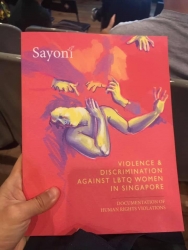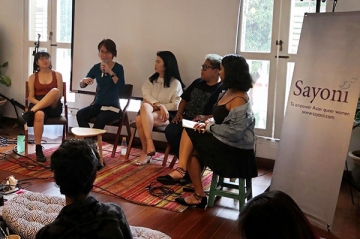“The content of Lee Low Tar has been disallowed as it had gone beyond good taste and decency in taking a disparaging and disrespectful view of public officers.”
The event will still go on, but as a talk, not an arts event. I believe that Yi-Sheng will spend his allotted time sharing with the audience his views about the MDA and the inspiration behind this story.
* * * * *
A fictional, metatextual farce by Ng Yi-Sheng
Composed Tuesday 24 July, 2007.
Denial of licence communicated Tuesday 31 July 2007.
Dear Sir/Madam,
Re: Application for Arts Entertainment Licence
Thank you for your application dated 25/07/2007 to hold a public reading of literary work. As you must know, the Media Authority on Development (MAD) is extremely supportive of the development and dissemination of Singapore writing. We welcome such events as yours as a vital element in the growth of our national culture.
This being said, however, we regret to inform you that one story, and one story alone – in your programme lineup, has not met with our board’s approval. Even by our liberal standards, we have been forced to rule that Ng Yi-Sheng’s “Lee Low Tar” is not a work of literature, but a specimen of the most degraded pornography known to man.
Indeed, the author admits as much when he introduces the text in his preface as “an account of the perverse and prurient adventures of the dangerously beautiful and seductive schoolboy Vladimir Koh Nah Bay”. His unusual protagonist, an avowed nymphomaniac by the age of eighteen, is to spend the greater part of the ensuing pages engaging in a number of highly imaginative sex acts with men; a premise which our board of reviewers, in the light of Section 377A of the Penal Code, cannot condone.
This fact in itself would be sufficient grounds to disqualify the tale for licensing. Yet the author further complicates matters by making Vladimir Koh one of a peculiar and unique variety of perverts; namely, the gerontophile, one who derives erotic pleasure through contact with old men. And I quote:
Give me an elder of the city; a senior citizen, a sage, a pasha or pundit with a noble bearing and pleated skin. Give me milky eyes and delicious dapples of brown on the dermis, knobbled joints and distended bellies bearing the memory of a thousand suppers, dry lips and sweet gums, cold fruity breaths and withered tongues. Give me wizened feet on wheelchair stirrups, stone knuckles on Zimmer frames, hearing-aids, eyeglasses with chains behind and clefts in the middle for bifocal correction, give me hairlines of white and grey and caramel, receding into the napes of scrawny necks and thereafter into clothing stinking of chloroform. Off with those wet pyjamas, I will have your shrunken sex.
We believe that Vladimir Koh represents an inaccurate reflection of the homosexual community, which is commonly known for its adoration of young, muscular men. Such a contrary character will only frustrate expectations and stimulate widespread depression in the community.
We further believe that he sets an extremely poor example for the youth of our country to follow. Consider, for example, the episode wherein Vladimir discovers his proclivity towards the aged, during a field trip to an old folks home:
As we linked palms and unshut our mouths to sing “Friends Forever”, our knees knocking in our starched white uniforms, I espied his face in the wizened crowd. For an instant, our gazes locked. A soft unfurling occurred in my pubescent loins. From that toothless mouth, methought I glimpsed a smile. A knowing smile.
I stammered through the remainder of the melody, and sprinted off the stage as we reached our coda. What could this mean? Was I not built for the flush of youth, but for the ripeness of senescence? Was I - dare I say it - a dirty young man? The blood pounded in my transfigured heart as I beheld him, wheeling himself over from the centre of the room.
Xiao di di, ni shen me ming zi?” he asked me.
I could not answer. It was my conscious hands which spoke, wresting hold of his chair’s handlebars and steering us straight for the disabled toilet, where my fumbling fingers unstrung his baggy pants…
The ensuing passage is unsavoury on multiple levels. First, it describes a transgression of the still intact laws on oral sex, consensual or otherwise. Second, its events are supremely contrary to our moral imperative that the young respect the aged, rather than sitting on their faces with an index finger stuck up their posteriors. Third, it represents a hazardous model for our youth to emulate. What is to stop our students from similarly initiating sex with older men on their pastoral care trips, and then, in imitation of Vladimir Koh Nah Bay, joining the Interact Club in order to visit the home every weekend, both Saturdays and Sundays, while their oblivious teachers stand by and nod in approval?
Vladimir Koh has not even the decency to commit to his first victim, having exhausted him within a month to a state of catatonia. Our department was profoundly disturbed by the graphic accounts of the character’s promiscuous consortings with his elderly charges, in three different charity homes, two hospices and an ICU. Details of “snowy-white pubes” and “marvellous buttocks, furrowed like hardwood lichens” and his ingenious use of false teeth as a device for mutual pleasure were both gratuitous and unnecessary.
Vladimir’s consequent graduation from junior college and enlistment in the army came as a momentary relief for those of us who hoped that the work might then evolve into a more conventional coming-of-age novella. We were thus dismayed by the author’s monomaniac focus on the sexual development of his character, representing scene after scene of furtive coition on the part of the hero with a rapid succession of warrant officers, majors, colonels, lieutenant-colonels, generals and canteen uncles. And I quote:
As I stroked his thigh, the RSM moaned in hapless pleasure.
“Recruit Koh! You… you must drop 20 now! I have a wife, three children, two grandchildren and a mistress in Bintan!”
The crabs on his lapels trembled as I unbuttoned the fly of his number four. I cast his trousers across into the corner of the armskote room and looked archly into his eyes.
“But certainly, Warrant Singh. I will knock it down. I will knock it down. And in, and up, and towards any direction you desire.”
“Recruit Koh! You must not…”
He attempted to run, but I ran after and touched his tree. And he ran back. And I oiled his weapon. I feasted on that combat ration, the tastiest night-snack in BMTC. I played with his signal set, and when I stuck my equipment into his firing chamber, elephants came out the other end…
We need not list, as the author does with distressing gusto, the chapters that trace Vladimir’s dalliances with scholarship boards and university professors, nor his entanglements, upon securing work in a government-linked corporation, with senior civil servants, rival CEOs, foreign trade delegations and a preternatural array of Japanese businessmen. Far too many officers in our department have had the misfortune of being called on to review this filth, and have spent sleepless nights attempting to recover from the psychological trauma. It is, in addition, irresponsible and unrealistic to portray such a character as Vladimir as being able to shoot to the upper echelons of Singapore commerce and politics while retaining his sculpted, youthful appearance together with the libido and sexual endurance of a horse.
It pains me to speak further of this text, but I have yet to highlight the author’s most shameful literary transgression, which begins in Chapter 69, during National Day Celebrations, when seated in proximity to the Members of Parliament.
Amidst the pomp of scarlet balloons and nacreous ribbon, I sneered at the sickening mass of toned muscle and limber skeleton before me. Post-65 MPs, all of them! Hip-hop dancers and bloggers, sickening in their pretense to stentorian dignity!
Then I saw him enter. The great founder of our country, the grand architect, who forsook his crown that our future might grow in the hands of his son! Slowly, like a taichi master, he made his way to the box seats, camera lenses glued to his every movement.
I was rapt. I salivated into my goody-pack.
Then he turned. He squinted. Our gazes locked.
Who is this politician the author refers to? The one he calls “Lee Low Tar”? Oh, he may think he is very clever, but he has dug his own grave with a fiction that is libelous; nay, deserving of excommunication for its sin!
What twisted anger rests in this man’s soul, that he would compose the twenty-page scene that follows in the National Stadium shower rooms, with three hundred schoolchildren in glitter makeup hammering at the door demanding to be allowed to urinate?
Never shall I be able to look at a chemiluminescent lightstick, a miniature flag, nor a string of orchids the same way ever, ever again! The sadist! Why, he even made him cry!
For my part, I had ample reason to cry as the story continued with the elopement of Vladimir and said politician to Suzhou, with honeymoon vignettes that made me want to wash my eyes with bleach! Has the author no gratitude for his role in our nation’s development, or at least on behalf of his community, for the recent comments on the eventual repeal of our sodomy laws? After all, it is not this man who is plagued by rumours about his * but I say too much.
The board was ultimately calmed by the author’s decision to eventually dissolve this cursed union.
“But I love you,” wailed Lee Low Tar.
“Do you?” I replied, as the gossip reporters clamoured at the door of our hotel room. “But, my sweet emperor, I had believed this much was true. You and I, we are not built for love, but for conquest.”
“Such defamation! Of course I have loved! I have loved my country.”
“To love is not to control. To love is to relinquish power, to be vanquished, to be destroyed. And you, my beautiful, shall never be destroyed.”
The book’s conclusion, however, is far from satisfactory. As Vladimir Koh absconds to continue his venereal peregrinations across the globe, Lee Low Tar returns to the country and institutes a series of campaigns encouraging the worship of old men as sexual objects. Their nation, which remains cunningly (but not cunningly enough) unnamed, thus becomes a haven for elderly males, as gerontophilia becomes the norm, with even senior citizens competing amongst themselves over who can have the oldest boyfriend. Romances between those under 40 years of age becomes frowned upon and censored as obscene, and youth are frustrated in their passions, though they live in the knowledge that as they age, every day brings them closer to carnal bliss.
To recapitulate: under threat of legal action, you will not, I repeat, you must not read “Lee Low Tar” at your literary evening. If you are discovered to be distributing copies either in print or electronically you shall be fined and charged under the Sedition Act and detained in a room with hyperactive air conditioning. The story espouses values entirely opposite to those treasured by our Asian forefathers and tars the image of persons who shall go unmentioned and incites lust for activities against the order of nature.
You see, it is not without grounds that we make these statements. The MAD has a policy against sanctioning media that “promote homosexuality”, and “Lee Low Tar”, sadly, has been all too effective in this area.
I myself first began to realise the hazards of reading the story on page 52, during the scene in the principal’s office, when I began to fondly recall being caned by the discipline master in my school. From then on I read the text with a mixture of apprehension and feverish agitation, as I began to recognise in Vladimir’s ardent romps something not unlike my own fantasies.
I read and read until ten o’clock at night, when the 63 year-old janitor came in to clean the windows and empty the wastebaskets. Suffice it to say that the wastebaskets were not the only things that were emptied that night.
Racked with self-loathing, I transferred this assignment to one of my fellow officers, who shall also go unnamed. For the following week, he together with five singlet-wearing uncles in his void deck were arrested for public indecency, involving several Chinese chesspieces and a singing mynah-bird. The officer he had passed the file to had disappeared from his home, leaving only a tainted bottle of Guinness stout and a used prophylactic. And so on, and so on, until I realised, that to halt the damage, I alone would have to complete the report.
I write this letter from under the desk of my Permanent Secretary, as has become my habit, in order to better admire the curvature in his trousers. For the love of God, and for the sake of our country’s future, do not let this story be read.
In addition, we hope to expedite a commissioned work with Ovidia Yu. She, as a treasured resource on feminine issues, would surely be able to compose an antidote tale to straighten us out.
Yours faithfully,
(Name and position withheld)
Media Authority on Development.
* * * * *
[The following paragraph was used as a header to the text, to make the circumstances of the story completely clear to the censors:
Note: The author is aware that there is a high chance this text may not be permitted for public reading during IndigNation, and thus has supplied a backup text (an extract from his university memoir, "Diary of a Stone Monkey"). He nonetheless wishes to make it clear that "Lee Low Tar" was written specifically for this reading, and is his preferred text for the night. MDA will of course be aware that the denial of a licence to read this story will generate negative publicity for itself while increasing public interest in the story, allowing its for its greater distribution.
Should the story be approved, the author will ensure that an announcement is made before this and any future readings that the below letter is entirely fictional, as are the characters featured within (save for the names of himself and his friend Ovidia Yu).]



